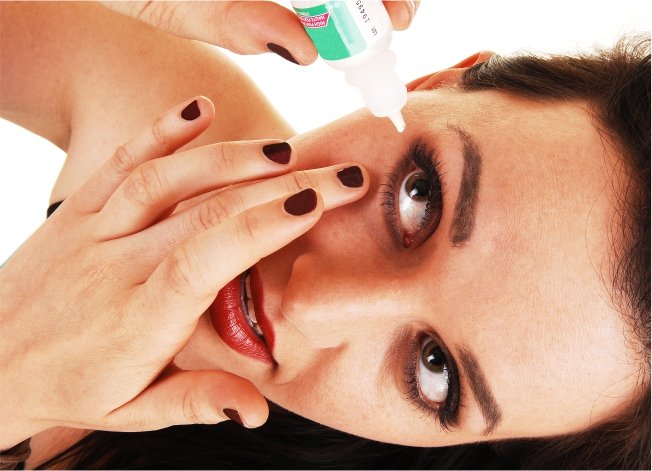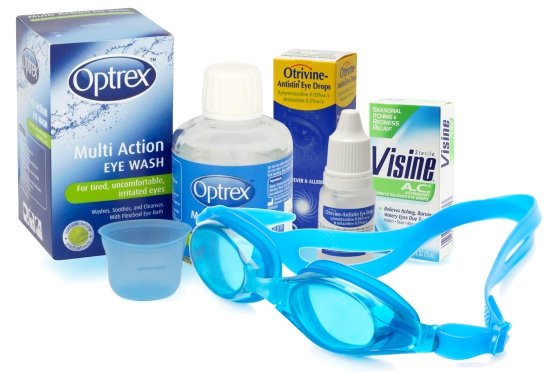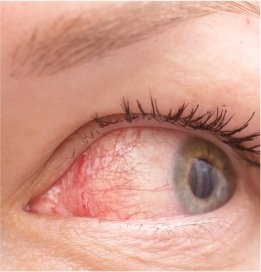

By Stephanie Simons,
Head Pharmacist,
Lindo’s Pharmacy in Devonshire
Summer is in full swing now and many of us are enjoying spending our days out in the sunshine. It is important, though, to take care of ourselves as we make the most of the good weather. Along with the risk of sun burn and dehydration, summer brings around greater instances of eye injuries – particularly in children – so we have put together some tips to take care of your sight this season.
Allergy sufferers often put up with symptoms all year round in Bermuda and summer is no exception, with our native flowers in bloom across the island. Allergy medications can help to keep itchy eyes, rashes and sniffles to a minimum but if you prefer to target the symptoms directly without dealing with any other possible side effects, such as drowsiness, drops such as Visine AC, Otrivin-Antistin and Opticrom can be very effective.
 While encouraging your children to play outside is wonderful for developing their sense of imagination and will allow them to get a good workout, parents often come to expect injuries to happen – amongst these are eye injuries which can be caused by rough play, branches or dust. This is a normal part of growing up and shouldn’t deter parents from letting children explore the great outdoors, but it pays to be prepared.
While encouraging your children to play outside is wonderful for developing their sense of imagination and will allow them to get a good workout, parents often come to expect injuries to happen – amongst these are eye injuries which can be caused by rough play, branches or dust. This is a normal part of growing up and shouldn’t deter parents from letting children explore the great outdoors, but it pays to be prepared.
A bruised or swollen eye should be treated in much the same way as a regular bruise would be treated: a cold pack should be applied to the injury for short periods of time. Pain can be relieved with over the counter painkillers such as acetaminophen (Tylenol) or ibuprofen (Advil).
An irritated eye that has dust or other particles in it can be flushed with an eyewash such as Optrex which will soothe the eye and help to dislodge anything stuck in it. It is also important to avoid rubbing the injury which might make it worse, even though it will itch.
Swimming is a great way to cool off, but it can irritate the eyes, whether it is seawater or chlorine from the pool. If you have a swimming pool, check that it is not overchlorinated – this can cause stinging pain and dry eyes. The correct pH level for a swimming pool is 7.4, which is the same level as the pH level for human eyes. It can be helpful for children to wear goggles while they are swimming, to keep irritants out.
 Many people complain of feeling dried out in the summer, as air conditioners are switched on more regularly and, as a result, dry eyes are a common symptom of this. To avoid this, take care to minimise the use of your air conditioner at home: if it is a breezy day, encourage a cross draft by opening windows on opposite sides of the house and use an electric fan. Before bedtime on warm nights, run the air conditioning on full until it’s time to sleep and then switch off the air conditioning in favour of an electric fan. If dry eyes become too uncomfortable then you may want to use an eye-drop product such as Systane, Genteal or Blink, which help to lubricate the eyes and ease any discomfort.
Many people complain of feeling dried out in the summer, as air conditioners are switched on more regularly and, as a result, dry eyes are a common symptom of this. To avoid this, take care to minimise the use of your air conditioner at home: if it is a breezy day, encourage a cross draft by opening windows on opposite sides of the house and use an electric fan. Before bedtime on warm nights, run the air conditioning on full until it’s time to sleep and then switch off the air conditioning in favour of an electric fan. If dry eyes become too uncomfortable then you may want to use an eye-drop product such as Systane, Genteal or Blink, which help to lubricate the eyes and ease any discomfort.
Whenever a group of children are in close contact with one another, there is always the risk of a spread of infection. This can often lead to the much dreaded ‘pink eye’ sweeping through your child’s friendship circle or siblings. Polysporin Antibiotic Eye Drops can help to treat these quickly and efficiently and does not require a prescription: you may find it useful to keep a bottle in your medicine cabinet if a family member is prone to eye infections.
In addition to obvious physical ailments, it is important to look after the long-term health of your eyes: wearing sunglasses and a hat will help reduce glare and strain and will reduce the chance of squinting which can result in headaches.
If eye pain, redness or itching lasts longer than a few hours, then you should consult a pharmacist or a doctor. If there is any sensitivity to light or signs of a progressing infection, such as a build up of ‘eye gunk’ or if the eye has been scratched, then you should make an appointment to see a doctor.
Stephanie Simons is the head pharmacist at Lindo’s Pharmacy in Devonshire. She earned her Bachelor of Science in Pharmacy at Massachusetts College of Pharmacy and has been practicing for over 20 years. She is a registered pharmacist with the Bermuda Pharmacy Council and is a member of the Bermuda Pharmaceutical Association.


